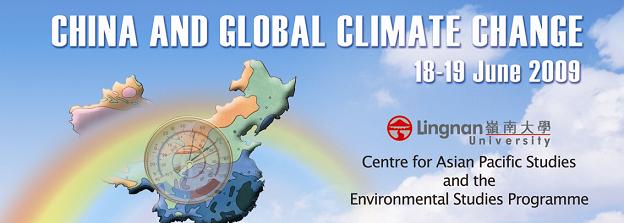
Event Title
Conference on China and Global Climate Change : Reconciling International Fairness and Protection of the Atmospheric Commons
Location
AM310, Lingnan University
Start Date
19-6-2009 9:00 AM
End Date
19-6-2009 10:30 AM
Language
English
Description
In the climate debate, there is a stalemate when the discussion revolves around other's responsibility based on historical emissions and present (un)willingness to participate in international treaties justified by a necessary focus on development on the one side, and an unwillingness to act if the others do not also do so, based on concern about economic competitiveness, on the other side. The problem arises from a view that sees it as a basic necessity to first develop, get rich enough, and then clean up, as suggested in Kuznet's Curve, and about relative costs of alternative energy and production, respectively. Looking towards the future, considering the changes necessary for prevention of further climate change and/or of adaptation, and the necessities for development that truly improves people's lives and the future economic outlook (e.g. in a more resource-constrained world), however, there is definite common ground. Recently, such ideas received a boost through the argument that "green jobs" were an excellent impulse for revitalizing the US (and other) economies. Taking the view further, either climate change or the effect of "peak oil" (or both) will require new strategies as well: approaches more focused on human well-being and long-term economic and ecological functioning than short-term profits. For those strategies, it will be necessary to have government and popular support, but also possible to build support in both industrialized and developing countries, as they offer a win-win situation. This paper will present the ethical and practical considerations for such a "positive ecological" approach to climate change that goes beyond the stalemate to suggestions for cooperation based on common interests in security, environmental health, and further economic development.
Document Type
Presentation
Recommended Citation
Schmidt, G. (2009). Looking beyond: Changes for climate change, changes for development. In China and global climate change: Proceedings of the conference held at Lingnan University, Hong Kong, 18-19 June 2009 (pp. 330-341). Centre for Asian Pacific Studies and the Environmental Studies Programme, Lingnan University, Hong Kong.
Included in
Looking beyond : changes for climate change, changes for development
AM310, Lingnan University
In the climate debate, there is a stalemate when the discussion revolves around other's responsibility based on historical emissions and present (un)willingness to participate in international treaties justified by a necessary focus on development on the one side, and an unwillingness to act if the others do not also do so, based on concern about economic competitiveness, on the other side. The problem arises from a view that sees it as a basic necessity to first develop, get rich enough, and then clean up, as suggested in Kuznet's Curve, and about relative costs of alternative energy and production, respectively. Looking towards the future, considering the changes necessary for prevention of further climate change and/or of adaptation, and the necessities for development that truly improves people's lives and the future economic outlook (e.g. in a more resource-constrained world), however, there is definite common ground. Recently, such ideas received a boost through the argument that "green jobs" were an excellent impulse for revitalizing the US (and other) economies. Taking the view further, either climate change or the effect of "peak oil" (or both) will require new strategies as well: approaches more focused on human well-being and long-term economic and ecological functioning than short-term profits. For those strategies, it will be necessary to have government and popular support, but also possible to build support in both industrialized and developing countries, as they offer a win-win situation. This paper will present the ethical and practical considerations for such a "positive ecological" approach to climate change that goes beyond the stalemate to suggestions for cooperation based on common interests in security, environmental health, and further economic development.

